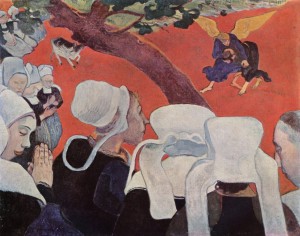 People who read poetry but don’t write it are like those who have just heard about the burning bush. They’ve got to write poetry. They’ve got to read it also, because then they’ve heard about the burning bush, but when you write it, you sit inside the burning bush, which is different. I think everybody should write poetry.
People who read poetry but don’t write it are like those who have just heard about the burning bush. They’ve got to write poetry. They’ve got to read it also, because then they’ve heard about the burning bush, but when you write it, you sit inside the burning bush, which is different. I think everybody should write poetry.
This radical viewpoint is that of poet Li-Young Lee, speaking to the editors of a rich book published a couple years ago, A God in the House: Poets Talk about Faith. When I recently quoted Lee’s words to a friend who is a fine poet, at first he scowled. Doesn’t writing poetry take special dedication and talent and hard work? That’s what his scowl seemed to ask. And yes, of course, writing good poetry does take all this.
But that’s not Lee’s unconventional point. He’s saying, in effect: everyone needs to nestle down inside language to get to know its ways, to get comfy with how playful it can be, how expansive, how unexpected in its openings to new experience.
Only then can they become readers of all the really good poetry that’s out there—much of it written by the nineteen poets interviewed for this book.
On what makes for “good” poetry, many of these poets have something to say. (The interviews in A God in the House were conducted separately; but gathered here between two covers, they inevitably and delightfully can seem in conversation with one another.)
For Jane Hirshfield, good poetry—indeed, all good writing—is a matter of bringing opposites together, into balance:
Whatever is present, its opposite is almost always present as well. I believe that good writing also does this. Great literature does not take sides…. Sometimes the other side is so deeply buried, you really have to part the grasses of the poem to find it, but in good poetry, that second dimension is always there. The poems we remember hold in themselves some undertow, some magnetic pull toward a fuller, subtler truth.
Hirshfield is giving us several metaphors here, and I love them all. That image of parting the grasses of a poem elicits for me the sweet smell of lying down in a meadow, searching for what lies beneath the grassy surface. Then the undertow and the magnetic pull: I feel their force, that pull toward a fuller truth that I do truly (and gratefully) experience in reading a good poem.
Christian Wiman also speaks of poetry’s “truth.” The point he’s eager to make is that poetry’s two dimensions of truth—the aesthetic and the moral—are inseparable:
Can there even be aesthetic truth without some other, more ultimate truth as precedent?… This is why a poet’s technical decisions are moral decisions, why matters of form and sound have existential meaning and consequences.”
There’s a lot to mull over in Wiman’s challenge here. To think that each word we choose has moral consequences. Doesn’t this apply to all our language, not only poetry? A friend recently told me, laughing, that she calls her husband “Sweetie” only when she’s angry with him. And, more consequentially, remember when white Americans addressed African American adults as “boy” or “girl”?
My husband and I wrote a book not long ago that’s grounded in exactly Wiman’s point: that aesthetic beauty and moral beauty are inseparable. Without moral beauty—that is, without the beauty of truth—the aesthetic is merely pretty.
Our book was about how recognizing this dimension of beauty can, specifically, help Christians and Muslims to value one another. So I was especially interested in how Carolyn Forché speaks, in A God in the House, about the collapse of distancing between the self and the other.
She speaks of “an awareness of one’s infinite and inexhaustible obligation to the other.” This, she adds, is for her “the realm of the sacred.”
As if in response, in affirmation and elaboration, Gregory Orr says:
One of the perils of being human, and of lyric poetry, is narcissism, the solipsistic sense that the self is all there is…. To me, the beloved is that figure that exists independent of the self, that figure that calls us into relationship with the world and saves us from what I consider the emotional, spiritual, and psychological error of solipsism and narcissism.
“Poetry,” Hirshfield in effect replies, “exists in part to enlarge us, to deliver us into the not yet known. Writing is an act that generates and expands attention. And if I’m lucky, I may write something that helps expand the life and attention of others as well.”
This brings me back to Li-Young’s Lee remark that I began with: “everybody should write poetry.” If, as Hirshfield says, writing generates and expands attention, then clearly everyone should do it. (We don’t want to repress and shrink our attention, do we?)
And it seems more and more, thanks to the Internet, that nearly everyone does now write poetry. Blog-hosts like WordPress list “poetry” among their most popular tags. At Twitter, #poetry pulls up countless tweets.
It doesn’t matter whether all this is “good poetry” or not. It’s good for the human spirit to try it.
Peggy Rosenthal is director of Poetry Retreats and writes widely on poetry as a spiritual resource. Her books include Praying through Poetry: Hope for Violent Times (Franciscan Media), and The Poets’ Jesus (Oxford). See Amazon for full list. She also teaches an online course, “Poetry as a Spiritual Practice,” through Image’s Glen Online program.
Image used: Vision After the Sermon (1888), Paul Gauguin, oil on canvas, 28.4 x 35.8 in.











